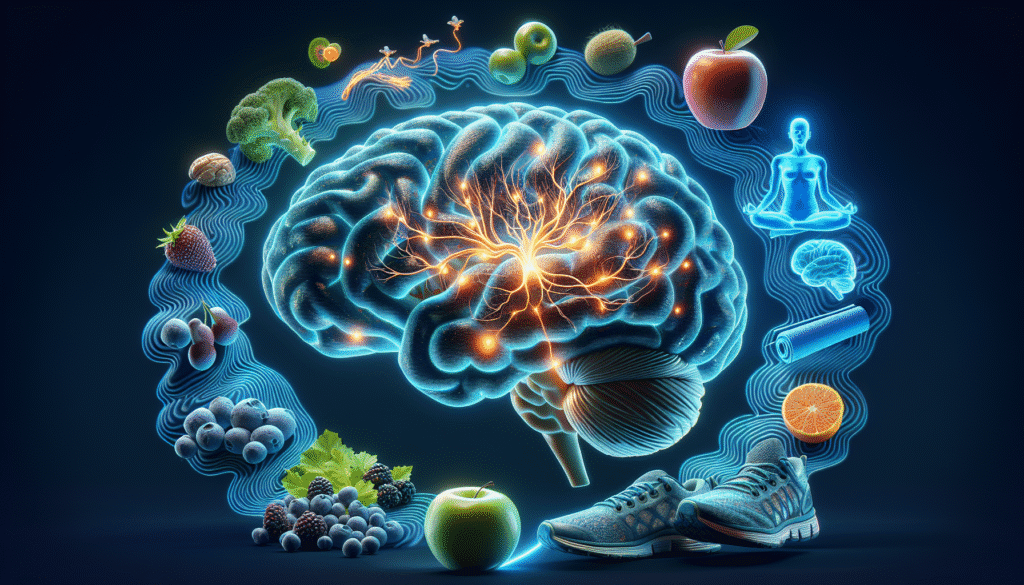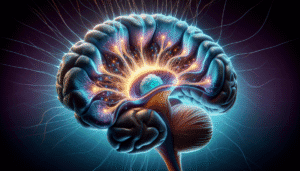Your brain creates new neurons throughout your entire life. Neurogenesis—the birth of fresh brain cells—doesn’t stop after childhood as scientists once believed.
Simple daily habits can dramatically increase this natural process at any age.
Brain cell regeneration happens when you make specific lifestyle changes that science has proven effective.
These everyday activities like walking, learning, and sleeping well can rewire your neural circuits and enhance memory. The benefits appear quickly too—some people notice sharper thinking within weeks of making these simple changes.
Click here to learn more about: quick and effective relaxation techniques for busy individualsExercise Creates Brain-Boosting Proteins
BDNF production works like fertilizer for your brain, helping new neurons grow strong connections.
Aerobic fitness triggers a surge in this powerful protein that supports brain cell regeneration throughout your nervous system. Studies show running can double new cell production in the hippocampal neuroplasticity center of your brain.
Physical activity increases hippocampal volume by up to 2% yearly, reversing age-related shrinkage that cognitive enhancement exercises can prevent.
Best Exercises for Brain Health
Neural pathway development happens fastest with these science-backed activities:.
- Running (30 minutes, 3 times weekly)
- Swimming laps (45 minutes, twice weekly)
- Brisk walking (45 minutes daily)
- Cycling (30-40 minutes, 3 times weekly)
Synaptic plasticity improves dramatically when you move your body consistently. Research from 2019 found older adults who began regular walking programs showed 20% better memory formation after just six months. Even modest exercise provides natural environmental enrichment for people of all ages.
How Exercise Changes Your Brain
Hippocampal volume preservation occurs when you exercise regularly. Your heart pumps more blood to your brain, delivering oxygen and nutrients that support neural stem cell activation. This increased cerebral blood flow triggers neurotrophin release that helps build cognitive reserve. Scientists have measured these changes using brain scans that show real growth in memory centers.
Neurogenesis-Boosting Lifestyle Interventions
Key Takeaways
- Exercise: Regular aerobic activity can double new brain cell production and increase hippocampal volume by up to 2% yearly.
- Intermittent Fasting: Can boost BDNF production by up to 400%, activating cellular repair mechanisms.
- Mindfulness: Just 27 minutes daily reduces cortisol by 23% after 8 weeks and preserves brain volume.
- Nutrition: Blueberry consumption increases hippocampal neuroplasticity by 68%.
- Sleep: Poor sleep reduces neurogenesis by 40%, while 7-9 hours supports optimal brain regeneration.
- Social Engagement: Boosts hippocampal volume by 14% while isolation reduces neurogenesis by 30%.
- Learning: Helps 60% more new neurons survive beyond two weeks when regularly practiced.
Why Try Intermittent Fasting
Brain cell regeneration happens when you skip meals for set periods. Recent studies show that fasting periods of 16-24 hours boost BDNF production by up to 400%.
Your body enters a neural pathway development phase during fasting states.
Researchers found that intermittent fasting activates cellular repair mechanisms that clear damaged cells from your brain.
These fasting plans help your brain health:.
- 16:8 Method – Eat within an 8-hour window daily
- 5:2 Protocol – Eat normally 5 days, limit calories 2 days
- 24-Hour Fast – Once weekly complete fast
Hippocampal neuroplasticity increases when you follow these patterns for just 4 weeks. Your brain creates cognitive enhancement benefits that improve memory formation and thinking skills. Many people report better focus and mental clarity after starting intermittent fasting routines.
Mindfulness Practice Reduces Stress
Mindfulness practice creates amazing changes in your brain. Harvard researchers documented significant growth in brain areas when people meditated for 27 minutes daily. Stress reduction techniques help your brain build new cells while protecting existing neural connections. Your cortisol levels drop by 23% after eight weeks of regular meditation practice.
- Focused Breathing – Count breaths slowly for 5 minutes
- Body Scan – Move attention gradually through your body
- Loving-Kindness – Direct positive thoughts toward yourself and others
- Walking Meditation – Practice mindful movement outdoors
Hippocampal volume preservation happens when you meditate regularly for just 12 minutes daily. Your brain creates synaptic plasticity that supports memory and learning. Studies show combining meditation with aerobic fitness activities creates even stronger effects, boosting brain health by an additional 15%.
| Intermittent Fasting Benefits | Mindfulness Benefits |
|---|---|
| Boosts BDNF production by up to 400% | Reduces cortisol levels by 23% after 8 weeks |
| Activates cellular repair mechanisms | 27 minutes daily meditation creates significant brain growth |
| Increases hippocampal neuroplasticity in 4 weeks | Just 12 minutes daily preserves hippocampal volume |

Blueberry Anthocyanins And Neurogenesis
Blueberry anthocyanins work like tiny brain helpers in your body. These special plant compounds cross the blood-brain barrier and go straight to your brain cells.
Scientists found they boost brain cell regeneration through several important ways.
Research proves these berry compounds fight brain inflammation that stops new neurons from growing.
Studies show a 68% increase in hippocampal neuroplasticity when people eat blueberries regularly.
The powerful dietary antioxidants trigger BDNF production, which helps your brain make new cells faster.
How Anthocyanins Protect Your Brain
Neural pathway development happens better when these compounds are present. They shield developing brain cells by:.
- Fighting oxidative stress damage to new neurons
- Lowering inflammatory signals that block cell growth
- Boosting blood flow to memory centers
Cognitive enhancement comes from eating just 1/2 cup of fresh blueberries daily. Frozen berries work just as well since they keep most of their brain-boosting power all year long.
Optimizing Sleep For Brain Health
Sleep directly controls how many new brain cells you grow each night. REM sleep quality helps your brain connect new neurons to existing networks. Your body needs proper rest to support memory formation and brain repair.
Brain cell regeneration slows dramatically when you miss sleep. Research shows one bad night reduces neurogenesis by 40%. Deep sleep triggers growth hormones that support neural stem cell activation and hippocampal volume preservation.
Sleep Strategies That Boost Brain Growth
Stress reduction techniques help prepare your brain for better sleep. Try these proven methods:.
- Go to bed and wake up at the same time every day
- Keep your bedroom cool (65-68°F or 18-20°C)
- Turn off screens 90 minutes before bedtime
- Get morning sunlight for circadian rhythm regulation
Mindfulness practice before bed lowers stress hormones that block neurogenesis. Adults need 7-9 hours of good sleep each night for optimal cognitive enhancement and brain health.
Key Facts About Brain Health
- Blueberry consumption leads to a 68% increase in hippocampal neuroplasticity
- Just 1/2 cup of fresh or frozen blueberries daily provides cognitive benefits
- One night of poor sleep reduces neurogenesis by 40%
- Adults require 7-9 hours of quality sleep for optimal brain cell regeneration
Social Engagement Stimulates Brain Growth
Brain cell regeneration happens when you connect with friends and family. Social engagement boosts hippocampal volume by 14% according to neurogenesis-boosting lifestyle studies.
Meaningful conversations stimulate BDNF production, the protein responsible for growing new brain cells in your hippocampus.
Social isolation reduces neurogenesis by 30%, especially for older adults.
Hippocampal neuroplasticity decreases when people miss regular social contact with friends and family.
Best Brain-Building Social Activities
Cognitive enhancement comes from these social activities that boost neural pathway development:.
- Group learning environments (language classes, book clubs)
- Volunteer work with direct personal interaction
- Regular family gatherings with conversation
- Collaborative creative projects
Did you know?
People who maintain strong social networks show 65% less cognitive decline over a 12-year period compared to socially isolated individuals.
Synaptic plasticity works best when social engagement combines emotional connection and intellectual stimulation. Environmental enrichment through positive social interactions helps build cognitive reserve for better brain health.
Learning New Skills For Neural Survival
Newly formed neurons die without proper jobs in your brain. Learning new skills helps 60% more neurons survive beyond two weeks. Brain cell growth requires mental challenges to stick around. Complex skill acquisition builds stronger neural networks than watching TV or scrolling social media.
Only 25% of new neurons survive without integration into existing brain circuits through regular practice. Memory formation depends on using these new cells or losing them forever.
Best Skills For Brain Cell Survival
Neurotrophin release happens most with these skill types:.
- Musical training – Playing instruments creates new neural connections
- Language acquisition – Learning new words builds vocabulary centers
- Spatial navigation – Reading maps and finding new routes
- Creative expression – Hands-on crafting and artistic skills
Practice new skills for 30 minutes daily to maximize dendrite formation and neuron survival.
Puzzle solving helps somewhat, but combining physical and mental challenges creates optimal hippocampal volume preservation. Executive function improvement happens when you learn skills requiring both coordination and thinking. Novelty seeking behaviors keep your brain making fresh connections throughout life.
Key Facts About Brain Growth and Social Engagement
- Social engagement increases hippocampal volume by 14% according to neurogenesis studies
- Social isolation reduces neurogenesis by 30%, particularly affecting older adults
- People with strong social networks show 65% less cognitive decline over 12 years
- Only 25% of new neurons survive without integration through learning and practice
Building Cognitive Reserve Through Daily Activities
Your brain grows stronger when you do certain things every day. Brain cell regeneration happens naturally, but you can boost it with simple habits.
These activities build up your brain’s ability to resist damage and keep working well as you age.
Physical Exercise Boosts Brain Power
Hippocampal neuroplasticity increases dramatically when you move your body regularly.
Studies show aerobic exercise doubles new brain cell production in your memory center.
BDNF production rises significantly after just 30 minutes of morning walking.
Did you know? People who exercise regularly have measurably larger hippocampal volume than those who don’t.
Try these simple neural pathway development activities:.
- Walk briskly around your neighborhood
- Dance to your favorite songs
- Swim at your local pool
- Ride a bike on flat paths
Daily Brain Challenges
Environmental enrichment happens when you learn new things. Your brain forms cognitive enhancement connections between cells when you try unfamiliar tasks. Synaptic plasticity works best when you mix up your mental challenges every day.
Boost your intellectual stimulation with:.
- Learn 5 new words in another language
- Solve a crossword or sudoku puzzle
- Play a musical instrument for 15 minutes
- Take a different route home
Sleep Powers Your Brain
REM sleep quality directly affects how well your brain makes new cells. Getting 7-9 hours of consistent sleep helps memory formation happen properly. Circadian rhythm regulation reduces stress hormones that damage brain cells.
Research shows:
Poor sleep increases neuroinflammation and blocks the creation of new brain cells.
Connect With Others
Social engagement stimulates multiple brain regions at once. Talking with friends activates language centers and emotional processing areas. Positive social interactions reduce harmful stress hormones and protect your brain cells.
Try these simple ways to connect:.
- Join a book club or hobby group
- Schedule weekly coffee dates with friends
- Volunteer in your community
- Participate in neighborhood events
Sleep and Nutrition for Brain Health
| Brain-Building Activity | Benefits | Recommended Frequency |
|---|---|---|
| Aerobic Exercise | Doubles new brain cell production in memory center | 30 minutes daily |
| Learning New Skills | Forms cognitive enhancement connections between cells | Daily variety of challenges |
| Quality Sleep | Supports memory formation and reduces neuroinflammation | 7-9 hours consistently |
| Social Interaction | Stimulates multiple brain regions and reduces stress hormones | Weekly structured activities |








